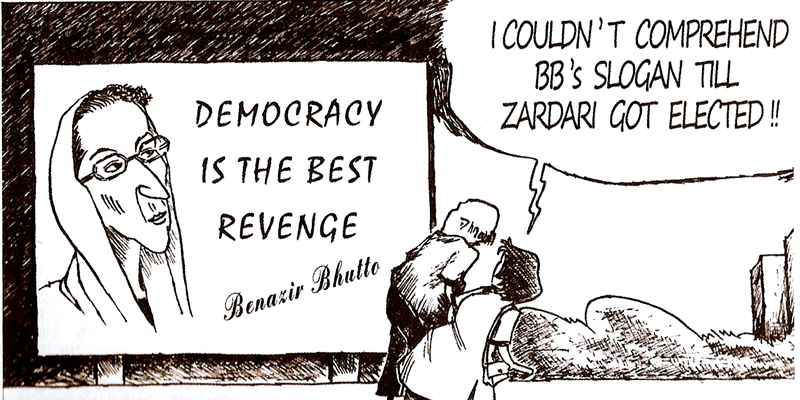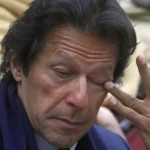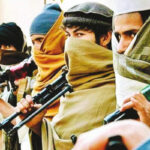People ask what does one mean by constitutional reforms:
“I do not believe in the collective wisdom of individual ignorance.”
–Thomas Carlyle
Everyone talks of democracy nowadays. They say that it does not work in Pakistan because it is always disrupted. That it has never been allowed to mature. That the establishment is the culprit; it is disruptive in posture, interfering in demeanour, always attacking democracy. That democracy should be given a chance, Pakistan needs more democracy. But who has ever denied this or contradicted this? Even dictators recognised the need for democracy, Ayub’s basic democracy, Yahya’s free and fair elections, Zia’s Majlis-e-Shura and Musharraf’s grass roots democracy. It is only military regimes that have allowed for local-body’s elections, the democratic setups have only done it when the Supreme Court has directed them to, just as when they were forced to holding the census. However, this is not about civil military supremacy; the military and the judiciary are subordinate to government and are a product of their policy, legislation and oversight. So why have these military take overs happened over the years? There are so many explanations for it, diverse opinions and varying arguments that it would suffice to accept that they happened and they should not have. Let’s move on.
Looking at the present environment one feels that there is a tussle between the civil and military/judicial setup all over again. So how has this civil-military-judicial divide come to a head? Some people have assumed that there is a hidden hand, a plot and a conspiracy. They demand that democracy must be allowed to prosper. Their demand is based on popular cliché, that democracy is not only the best form of governance but the only form. They quietly sneak off when one questions if Iran is democratic enough for them or why did democracy fail in Egypt? Everyone shies away from the comment, that in Afghanistan it is democracy which is fuelling the war. Now having raised the question, I would like to clearly state that I am not against democracy and in fact am all for it but first of all let’s at least determine which type of democracy should we have? There is western democracy as we see it with a huge liberal tilt and then China has a democracy too with a strong central control etc. etc. Whatever the case, democracy is governed by the principle that evolves around the universal convention: of the people, by the people, for the people. But then, government can only be as good as its people. But are the people of Pakistan free to make the right choices, do they have the capacity to make an independent decision or are they influenced and coerced. Ethnic consideration, linguistic affiliations, sectarian loyalties, feudal pressure, tribal and provincial influences, determine the vote more than political considerations. Should the State then succumb to the skewed choices of its hapless people as a vested elite play games with society.

Does Pakistan really even have a credible government in place where we can even talk of ‘democracy’ as a system in place; is there any system in place? We are not agreed even on are legal systems. We run parallel courts, the Common Law and the Sharia, then we have two kinds of citizens in Pakistan: the Muslims and the Non-Muslims, the latter are lesser citizens than the former. We have parallel economies, the formal one and an informal one. Our society is governed by race, ethnicity, sect and tribe more than by any law. Our population growth is out of control, our resources are dwindling, we have now been declared a water scarce nation, our society murders people who come to administer a polio shot to their children. So, in this environment, how can the people, the majority of whom survive from day to day on a pittance be expected to make rational choices? Democracy, Pakistan style is nothing but exploitation of the masses for an elite that prides itself more for breaking the law rather than following it. Their omissions and commission are celebrated by their voters as a recognition of the power they wield. For the voters, it is a competition to determine whose leader is the bigger rogue. So, when one says we must never disturb the democratic order, its simply saying one wants more of the same. In fact, when it is popularly argued in Pakistan that democracy only improves with more democracy, it is a total lie especially if it is this democracy one is speaking of. It is like expecting a thief to make laws on how to stop theft. Democracy in Pakistan cannot be juxtaposed from the west and that to without understanding what it is all about; it cannot be a mindless process adopted without thought based on artificially established conventions.
First, there is very little understanding of the difference between the State and Government. That former is an established reality and principle and that the latter is a product of a popular manifesto assisting the State and not contradicting it. Is this Quaid e Azam’s Pakistan? Has the ethos of State been trampled under the Ummah?
Second, people have a poor understanding of what is a ‘Constitution’, and they mistake it to be some sort of a bible which lies in the parliament and it is the whole nation’s duty and responsibility to protect it. There are many democratic countries that don’t even have a written constitution and UK is one of them. The Constitution is a set of rules, regulations and laws that in fact ‘protect the people from their government’ and not a document to protect the government itself. This should be clearly understood before one starts embracing the constitution emotionally and blindly. It is why some countries have a process of ‘judicial Review’ such as in Germany, where if the constitution is tinkered with or new legislation is made in contradiction to it, the Supreme Court has the jurisdiction to knock such legislation out. The ‘contradiction’, is invariably any clause that affects society negatively. Thus, in Pakistan, the constitution needs to be seen how it violates the rights of society and the people; does it in fact serve the people at all? How can the government select and appoint accountability cells to monitor its own performance and how can these be independent when it is the government that appoints their heads/leaders?
Third, in Pakistan where only 2% pay tax, it is necessary to re-examine voting rights. A person who does not contribute towards the nation, breeds 20 or more children must not have a say in how the country needs to be governed. He has no interest in the country in the first place and his unfortunate circumstances only lead him to be exploited in the second place.
Fourth, one cannot expect development and progress if legislators are uneducated. How can a country be governed by uneducated people? Why would education be necessary when the law allows the nation to be led by the uneducated? And speaking of education, Madrassa education would not be enough and such education should remain only a qualification for being appointed as a khateeb or preacher etc. Then do we have a proper recognised education system at all in Pakistan?
Fifth, politics is too dynastic and the hold of single-family influences needs to be broken. A system needs to be put in place where political workers have to progress from local bodies to provincial parliaments and then on to national ones and to becoming ministers etc. A minister for any particular discipline must have some experience in that field and not just be a member of parliament. Provinces need to be broken up into smaller political units to disrupt the sentiment of provincialism.
Sixth, state funds must never be handed over to legislators. It is not their job. Development at lower level must be a function of local bodies and implemented by the bureaucracy.
Seventh, reforms are needed; Police must be totally depoliticised. Judiciary must be reformed to have a jury system or something equivalent.
Eighth, accountability across the board.
So, when you see the democratic setup in Pakistan as it exists, it is neither democratic nor is it capable of governance. To continue with it is to have pretensions of a democratic order where some are more equal than others, while justice is selective and corruption rules the roost. Having fresh elections again will only regurgitate the same people and we shall suffer from ‘business as usual’. There is a need for a system change. Some of the issues expressed above are those that are necessary to be addressed. There is not a single political party at present that has the capacity, will or the courage to undertake such change. Difficult decisions have to be made. These can only be done by a National Government or Technocrat Government. Pakistan cannot survive this kind of democracy and needs one that suits its own socio-politico fabric.
Lt. General Tariq Khan (Retired), an erudite general from Pakistan’s Armored Corps and a decorated War Veteran, is an expert on critical issues related to Terrorism & Insurgencies. General Tariq Khan during the Battle of Bajaur, transformed and re-shaped Frontier Corps into a relentless fighting force and raised FC’s own special forces popularly known as SOG. Commanded and led major operations in FATA from the frontline, his model on counter-insurgency is still applied to this day.
Lt. General Tariq Khan (Retired) leads CommandEleven’s Board of Advisors as our Patron-in-Chief.








